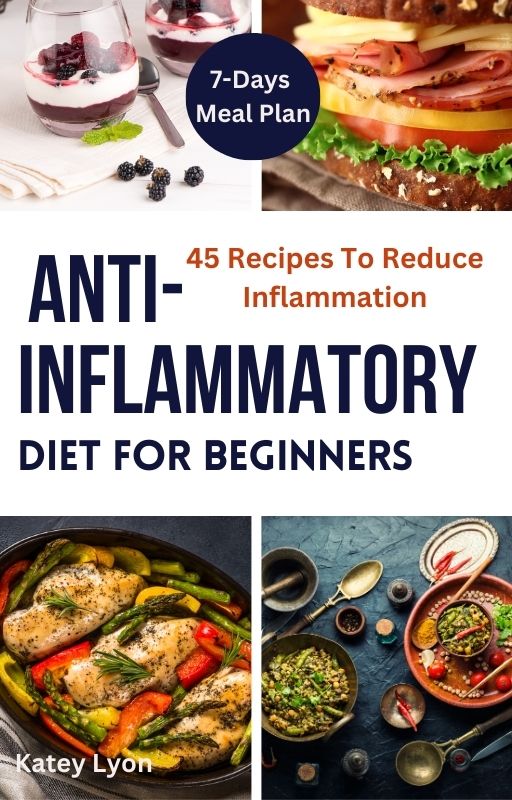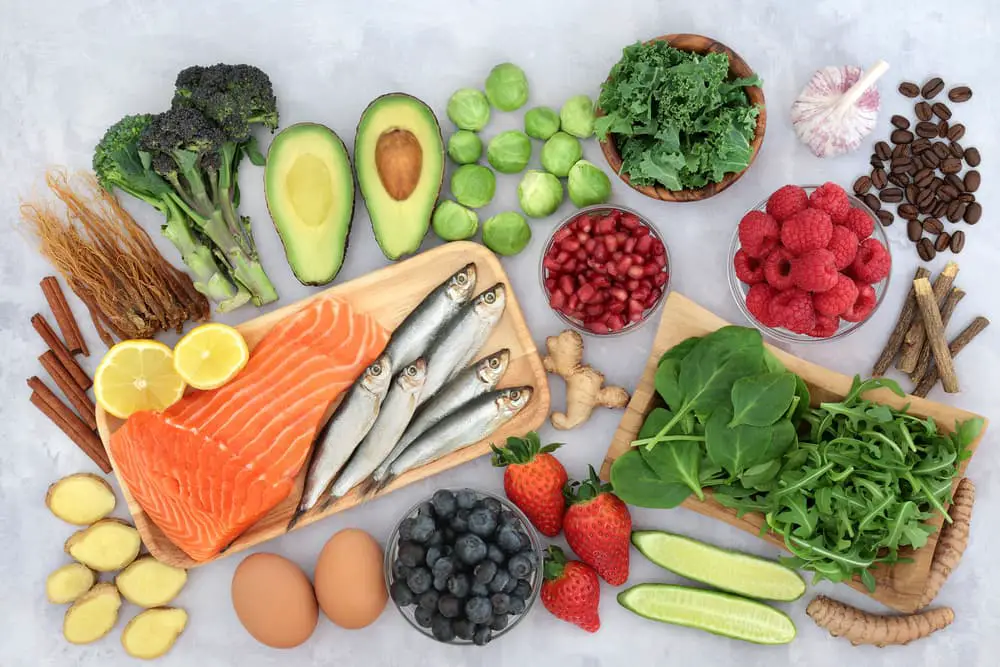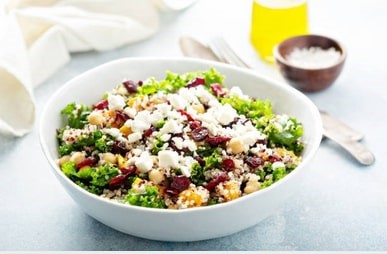Banish Inflammation in a Week: Simple & Delicious 7-Day Meal Plan
The anti-inflammatory Diet meal plan will help you start the anti-inflammatory diet. This diet emphasizes whole, nutrient-dense foods and aims to reduce inflammation in the body. Chronic inflammation is linked to several health issues, such as heart disease, diabetes, arthritis, and even some types of cancer.
The anti-inflammatory diet encourages the consumption of foods rich in nutrients such as antioxidants, omega-3 fatty acids, and fiber. These include colorful fruits and vegetables, whole grains, nuts, seeds, lean proteins, and healthy fats like avocados and olive oil.
On the other hand, the diet discourages consuming foods known to cause inflammation, such as processed foods, added sugars, fried foods, and refined carbohydrates. It also limits or avoids dairy products, red meat, and saturated and trans fats.
In addition to promoting overall health and reducing the risk of chronic diseases, the anti-inflammatory diet may help with specific conditions such as arthritis, inflammatory bowel disease, and asthma. However, it is important to note that this diet should not replace any medical treatments a healthcare professional prescribes. Before we go to the anti-inflammatory diet meal plan, let’s see the benefits of the anti-inflammatory diet.
Related: What is a typical anti-inflammatory diet?
Benefits Of The Anti-inflammatory Diet
The Anti-inflammatory diet meal plan, with approximate calorie counts for each meal. Please note that the calorie counts are approximate and may vary depending on the ingredients used.
Anti-inflammatory foods to focus on
It would be best if you concentrated on including the following anti-inflammatory items in your diet if you are making a different anti-inflammatory diet meal plan than the one we propose in this article:
- Fruits: Excellent options include berries, cherries, oranges, grapefruits, lemons, limes, kiwis, and pineapples.
- Vegetables: Cruciferous vegetables like broccoli, cauliflower, and Brussels sprouts, as well as dark leafy greens like kale, spinach, and collard greens, are all excellent sources of anti-inflammatory elements.
- Nuts and seeds: Walnuts, almonds, chia seeds, and flaxseeds are all abundant in omega-3 fatty acids, which have been shown to reduce inflammation.
- Brown rice, quinoa, barley, and oats are all excellent alternatives for whole grains.
- Salmon, mackerel, and sardines are among the fatty fish rich in omega-3 fatty acids, which fight inflammation.
- Spices and herbs: Turmeric, ginger, garlic, oregano, and rosemary are all anti-inflammatory and can be used in a variety of foods.
- Green tea: Studies have indicated that the antioxidants and polyphenols in green tea can lower inflammation in the body.
Always remember that eating a balanced diet is essential to staying healthy. A certified dietician or healthcare expert should always be consulted before making significant dietary modifications.
Anti-inflammatory Diet vs Mediterranean diet
Both the Mediterranean diet and the anti-inflammatory diet are healthful eating regimens that have been linked to numerous health advantages.
The anti-inflammatory diet emphasizes complete, nutritious foods that are high in anti-inflammatory substances, like fruits, vegetables, whole grains, nuts, seeds, and fatty fish. Additionally, pro-inflammatory foods, including processed meals, refined carbohydrates, and saturated and trans fats, are encouraged to be reduced or avoided.
On the other hand, the Mediterranean diet is based on the customary eating habits of those in the Mediterranean region. It contains many unprocessed, plant-based foods, including fruits, vegetables, whole grains, legumes, nuts, and good fats from sources like olive oil and fatty fish. Additionally, it permits moderate intakes of lean protein from sources like chicken and fish and moderate consumption of red wine.
Both diets have been linked to a lower risk of chronic diseases like heart disease, diabetes, and cancer and have been demonstrated to have anti-inflammatory effects. The Mediterranean diet, however, has been the subject of more research and has a larger body of proof proving its health advantages.
Ultimately, both diets encourage wholesome eating habits that can enhance general health and lower the risk of chronic illnesses. Your unique needs, interests, and health objectives will determine your best diet. Now let’s begin with the anti-inflammatory diet meal plan.
Anti-inflammatory Diet Meal Plan

Day 1:
Breakfast: Greek yogurt with berries and granola (300 calories)
Snack: Apple slices with almond butter (200 calories)
Lunch: Grilled chicken breast with quinoa and roasted vegetables (500 calories)
Snack: Carrot sticks with hummus (150 calories)
Dinner: Baked salmon with sweet potato and green beans (450 calories)
Total Calories: 1600
Day 2:
Breakfast: Oatmeal with blueberries and walnuts (350 calories)
Snack: Banana with cashew butter (200 calories)
Lunch: Spinach salad with grilled chicken, avocado, and balsamic vinaigrette (450 calories)
Snack: Mixed nuts (200 calories)
Dinner: Turkey chili with brown rice (500 calories)
Total Calories: 1700
Day 3:
Breakfast: Smoked Salmon And Poached Eggs On Toast (350 calories)
Snack: Greek yogurt with sliced peaches and honey (200 calories)
Lunch: Grilled tofu with quinoa and roasted vegetables (450 calories)
Snack: Edamame (150 calories)
Dinner: Grilled shrimp with zucchini noodles and tomato sauce (400 calories)
Total Calories: 1550
Day 4:
Breakfast: Green smoothie with spinach, banana, and almond milk (300 calories)
Snack: Apple slices with almond butter (200 calories)
Lunch: Roasted vegetable and hummus wrap (400 calories)
Snack: Mixed berries with whipped cream (150 calories)
Dinner: Grilled chicken with sweet potato and steamed broccoli (500 calories)
Total Calories: 1550
Day 5:
Breakfast: Greek yogurt with mixed berries and granola (350 calories)
Snack: Carrot sticks with hummus (150 calories)
Lunch: Grilled salmon with quinoa and roasted vegetables (500 calories)
Snack: Mixed nuts (200 calories)
Dinner: Turkey burger with sweet potato fries and coleslaw (450 calories)
Total Calories: 1650
Day 6:
Breakfast: Avocado toast with scrambled eggs (400 calories)
Snack: Banana with cashew butter (200 calories)
Lunch: Spinach salad with grilled chicken, strawberries, and balsamic vinaigrette (450 calories)
Snack: Edamame (150 calories)
Dinner: Baked cod with brown rice and steamed green beans (400 calories)
Total Calories: 1600
Day 7:
Breakfast: Chia seed pudding with mixed berries and almond milk (350 calories)
Snack: Banana with cashew butter (200 calories
Lunch: Grilled chicken with roasted vegetables and quinoa (500 calories)
Snack: Edamame (150 calories)
Dinner: Turkey meatballs with tomato sauce and spaghetti squash (450 calories)
Total Calories: 1700
Overall calorie range: approximately 2000-2200 calories per day.
I hope you will try this anti-inflammatory diet meal plan and leave a comment bellow !!
Want more recipes? Check The Easy Anti-Inflammatory Diet: 45 Easy Recipes to Reduce Inflammation
Anti-inflammatory Diet For Begginers
This book Includes a 7 Days Anti-inflammatory Diet Meal Plan











